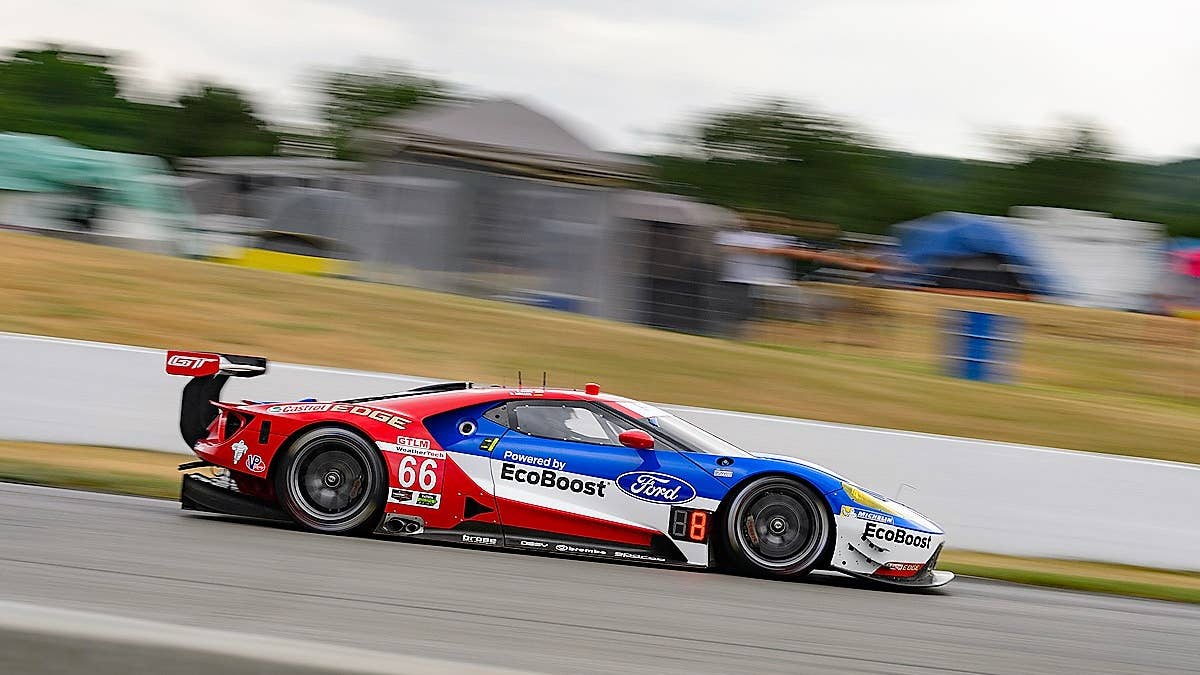Ford Outsmarts Chevrolet
Thus proving there’s more than one way to win a race.

This is getting embarrassing. Even IMSA, which sanctions the WeatherTech SportsCar Championship, seems to agree: In the week between the Sahlen’s Six Hours of the Glen and Sunday’s Mobil 1 Grand Prix at Canadian Tire Motorsport Park, they did something about it.
The Ford GT’s two-car team, which runs in the GT Le Mans class, in which pretty much every team receives some level of factory backing, debuted at the Rolex 24 at Daytona this year as a prelude to a single goal: Win its class at the 24 Hours of Le Mans, 50 years after the Ford GT swept the podium in 1966.
It’s astounding how quickly Ford Chip Ganassi Racing and Multimatic, which built it, have developed the car, ironing out the bugs we saw at Daytona and Sebring. Even so, it was a little bit of a surprise when the number 67 Ford GT, driven by Ryan Briscoe and Richard Westbrook, won at Mazda Raceway Laguna Seca on May 1.
Then the number 67’s team car won its class at the 24 Hours of Le Mans.
Then the number 67 won last week at the Sahlen’s Six Hours at the Glen, a six-hour endurance race at Watkins Glen in New York. And the number 66 was second.
It wasn’t just the three straight wins, it was the fact that the Ford GTs were about a second and a half quicker per lap at The Glen than the Chevrolet Corvette C7.Rs, which won Daytona and Sebring, and the Porsche 911s, which were so fast last year they actually won the season-ending Petit Le Mans, beating all the Prototype and Prototype Challenge cars.
So between the Sahlen’s Six Hours and Sunday’s Mobil 1 Grand Prix, IMSA did something they almost never do: Bypassed the rule that said to make changes in the rules, it has to give a seven-day advance notice before a race. But there is a “rare circumstances” clause that allowed them to change the “Balance of Performance” rules just four days prior to the start of practice.
And those changes were to slow the Ford GT down, and speed up the Corvettes and Porsches. The Fords were required to add 33 pounds of weight, and reduce the turbocharger’s boost. The Corvettes were allowed to remove 22 pounds of weight, and the size of the air restrictor was increased, allowing the engine to breathe better. The Porsches also got a 22-pound weight break.
And that did slow down the Ford GT – “We were expecting them to do something, but they hit us with a bigger hammer than we were expecting,” said a Ford GT crew member – and it sped up the Corvettes a lot, the Porsches a little.
The result was that driver Antonio Garcia qualified the number 3 Corvette on the pole. But the Fords were still second and third.
And in the race, the Corvettes were poised to win. But when the number 67 Ford GT made its last pit stop, the crew decided to save time and just add fuel. This would mean the Michelin tires would have to last an hour and 20 minutes, which is asking a lot.
But in the end, it wasn’t asking too much, and the number 67 Ford GT won. Now it's four straight. The Corvettes were second and third, outsmarted by gutsy pit strategy. “It was a great call,” Westbrook said. “Ryan had to do a hell of a job to hang on in the end and he did great. We’re just delighted that we have this momentum. Winning does become a habit they say, and it feels like it now. It’s pretty surreal.”
IMSA would kind of like to break that habit and let somebody else win. The next chance: Lime Rock in two weeks
